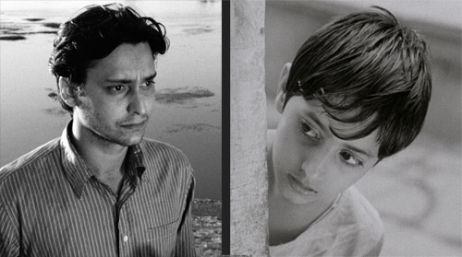I finally saw Satyajit Ray’s Apu Trilogy in its entirety this week. And yes, I loved it.
Epic in scope, the trilogy follows the life of poverty-born Apu from birth through young adulthood. None of the three films has a plot in any conventional sense, but they all brim with drama, laughter, joy, suspense, and heart-breaking tragedy. In other words, they’re about life in all of its complexity.
Except that it’s specifically about life in India in the first third of the 20th century. That means a very precarious life, in a society where dying of old age is rare. Almost everyone whom Apu loves dies too soon, and always of natural causes.
And it’s also, even more specifically, about the life of one man and his family.
The films have been newly restored from some very damaged elements. The original negatives were destroyed in a fire in 1993. But L’Immagine Ritrovata at the Cineteca di Bologna did the seemingly impossible, physically restoring much of the burnt negative to the point where they could be scanned. What they couldn’t recover they scanned from other sources, and you can see the quality difference. The restoration is a miracle.
I saw the films on consecutive nights at the Shattuck.
Like all great filmmakers, Ray didn’t work alone. Much of the film’s power comes from the musical score by Ravi Shankar (not yet famous in the West). I’m not enough of an expert to know for sure, but I think that Shankar’s music showed greater western influence in the last film, The World of Apu. That makes sense, because Apu’s world becomes slightly more westernized as the story progresses.
Subrata Mitra’s atmospheric photography brings a great deal to the films–especially the first one, Pather Panchali. Set in a rural village, the light plays with trees in ways that are both beautiful and dramatic. I don’t know if Mitra was influenced by Kazuo Miyagawa’s work on Rashomon, but it wouldn’t surprise me.

And of course there’s the cast. Four actors played Apu at different ages throughout the trilogy, and they all seem to be the same person (not that the transitions are as smooth as those in Boyhood, but Ray couldn’t wait that long). Kanu Banerjee and Karuna Banerjee give excellent performances as Apu’s parents, and Sharmila Tagore as his wife.
Ray’s eye for unusual faces rival’s Kurosawa’s. He finds people who seem grotesque, but deeply human and therefore beautiful. Consider Chunibala Devi–the 83-year-old actress who plays the only major character who gets to grow old. (Of course, there are plenty of attractive people in the cast, as well.)

Okay, a quick rundown of the films themselves:
Pather Panchali
Our hero is born early in this film, which then skips a few years so we can know him as a curious and mischievous child. Upbeat in nature, Apu seems to delight in the world around him–despite considerable hardship. His rural family lives in desperate poverty, and his educated but dreamy father’s unrealistic optimism doesn’t help. Apu’s mother is far more level-headed, and that makes her far more scared. Meanwhile, Apu and his older sister Durga play and fight and avoid their responsibilities. There’s a great deal of joy in this film, but a greater deal of tragedy.

I’m very tempted to give Pather Panchali an A+, but I think I need to see it a few more times before I can be sure it deserves that grade. So consider it a very high A.
Aparajito
As is so often with trilogies, the middle film is the weakest, but it’s far from weak. Apu grows from late childhood into late adolescence, and his view of India and the world widens considerably. He excels in school and becomes excited by science. In many ways, it’s a more optimistic film than its predecessor; this kid just might be going places.

But there’s a heavy price to pay for advancement out of his class. His now widowed mother can’t bear to lose Apu to the world.
I give it an A-.
The World of Apu
The adult Apu leaves college, but seems reluctant to grow up. Like his father, he’s a dreamer, and assumes that good things will come his way. His best friend from college does much better, but then, he came from a rich family. One good thing does come his way: He marries, almost by accident, and finds happiness and true love. But tragedy is never far away in Apu’s world.

As with Pather Panchali, I’ll hold off the temptation to give it anything higher than an A until I’ve had a chance to revisit it.

